2-Amino-6-chloro-3-nitropyridine

2-Amino-6-chloro-3-nitropyridine structure
|
Common Name | 2-Amino-6-chloro-3-nitropyridine | ||
|---|---|---|---|---|
| CAS Number | 27048-04-0 | Molecular Weight | 173.557 | |
| Density | 1.6±0.1 g/cm3 | Boiling Point | 339.9±37.0 °C at 760 mmHg | |
| Molecular Formula | C5H4ClN3O2 | Melting Point | 195-196 | |
| MSDS | N/A | Flash Point | 159.4±26.5 °C | |
| Name | 2-Amino-6-chloro-3-nitropyridine |
|---|---|
| Synonym | More Synonyms |
| Density | 1.6±0.1 g/cm3 |
|---|---|
| Boiling Point | 339.9±37.0 °C at 760 mmHg |
| Melting Point | 195-196 |
| Molecular Formula | C5H4ClN3O2 |
| Molecular Weight | 173.557 |
| Flash Point | 159.4±26.5 °C |
| Exact Mass | 172.999207 |
| PSA | 84.73000 |
| LogP | 2.63 |
| Vapour Pressure | 0.0±0.7 mmHg at 25°C |
| Index of Refraction | 1.658 |
| InChIKey | WERABQRUGJIMKQ-UHFFFAOYSA-N |
| SMILES | Nc1nc(Cl)ccc1[N+](=O)[O-] |
| Storage condition | Refrigerator |
Synonym:None Section 2 - COMPOSITION, INFORMATION ON INGREDIENTS
Risk Phrases: None Listed. Section 3 - HAZARDS IDENTIFICATION EMERGENCY OVERVIEW
The toxicological properties of this material have not been fully investigated. Potential Health Effects Eye: May cause eye irritation. The toxicological properties of this material have not been fully investigated. Skin: May cause skin irritation. The toxicological properties of this material have not been fully investigated. Ingestion: May cause gastrointestinal irritation with nausea, vomiting and diarrhea. The toxicological properties of this substance have not been fully investigated. Inhalation: May cause respiratory tract irritation. The toxicological properties of this substance have not been fully investigated. Chronic: No information found. Section 4 - FIRST AID MEASURES Eyes: Flush eyes with plenty of water for at least 15 minutes, occasionally lifting the upper and lower eyelids. Get medical aid immediately. Skin: Get medical aid. Flush skin with plenty of water for at least 15 minutes while removing contaminated clothing and shoes. Wash clothing before reuse. Ingestion: If victim is conscious and alert, give 2-4 cupfuls of milk or water. Never give anything by mouth to an unconscious person. Get medical aid immediately. Inhalation: Remove from exposure and move to fresh air immediately. If not breathing, give artificial respiration. If breathing is difficult, give oxygen. Get medical aid. Notes to Physician: Section 5 - FIRE FIGHTING MEASURES General Information: As in any fire, wear a self-contained breathing apparatus in pressure-demand, MSHA/NIOSH (approved or equivalent), and full protective gear. During a fire, irritating and highly toxic gases may be generated by thermal decomposition or combustion. Vapors may be heavier than air. They can spread along the ground and collect in low or confined areas. Extinguishing Media: In case of fire, use water, dry chemical, chemical foam, or alcohol-resistant foam. Use agent most appropriate to extinguish fire. Use water spray, dry chemical, carbon dioxide, or appropriate foam. Section 6 - ACCIDENTAL RELEASE MEASURES General Information: Use proper personal protective equipment as indicated in Section 8. Spills/Leaks: Clean up spills immediately, observing precautions in the Protective Equipment section. Sweep up, then place into a suitable container for disposal. Avoid generating dusty conditions. Provide ventilation. Section 7 - HANDLING and STORAGE Handling: Wash thoroughly after handling. Remove contaminated clothing and wash before reuse. Use with adequate ventilation. Avoid contact with eyes, skin, and clothing. Keep container tightly closed. Avoid ingestion and inhalation. Wash clothing before reuse. Storage: Keep container closed when not in use. Store in a tightly closed container. Store in a cool, dry, well-ventilated area away from incompatible substances. Section 8 - EXPOSURE CONTROLS, PERSONAL PROTECTION Engineering Controls: Use adequate ventilation to keep airborne concentrations low. Exposure Limits CAS# 27048-04-0: Personal Protective Equipment Eyes: Wear appropriate protective eyeglasses or chemical safety goggles as described by OSHA's eye and face protection regulations in 29 CFR 1910.133 or European Standard EN166. Skin: Wear appropriate protective gloves to prevent skin exposure. Clothing: Wear appropriate protective clothing to prevent skin exposure. Respirators: Follow the OSHA respirator regulations found in 29 CFR 1910.134 or European Standard EN 149. Use a NIOSH/MSHA or European Standard EN 149 approved respirator if exposure limits are exceeded or if irritation or other symptoms are experienced. Section 9 - PHYSICAL AND CHEMICAL PROPERTIES Physical State: Powder Color: yellow Odor: None reported. pH: Not available. Vapor Pressure: Not available. Viscosity: Not available. Boiling Point: Not available. Freezing/Melting Point: 188.00 - 193.00 deg C Autoignition Temperature: Not available. Flash Point: Not available. Explosion Limits, lower: N/A Explosion Limits, upper: N/A Decomposition Temperature: Solubility in water: Specific Gravity/Density: Molecular Formula: C5H4ClN3O2 Molecular Weight: 173.56 Section 10 - STABILITY AND REACTIVITY Chemical Stability: Stable under normal temperatures and pressures. Conditions to Avoid: Incompatible materials, excess heat, strong oxidants. Incompatibilities with Other Materials: Oxidizing agents. Hazardous Decomposition Products: Hydrogen chloride, nitrogen oxides, carbon monoxide, irritating and toxic fumes and gases, carbon dioxide, nitrogen. Hazardous Polymerization: Has not been reported. Section 11 - TOXICOLOGICAL INFORMATION RTECS#: CAS# 27048-04-0 unlisted. LD50/LC50: Not available. Carcinogenicity: 2-Amino-6-Chloro-3-Nitropyridine - Not listed by ACGIH, IARC, or NTP. Section 12 - ECOLOGICAL INFORMATION Section 13 - DISPOSAL CONSIDERATIONS Dispose of in a manner consistent with federal, state, and local regulations. Section 14 - TRANSPORT INFORMATION IATA Not regulated as a hazardous material. IMO Not regulated as a hazardous material. RID/ADR Not regulated as a hazardous material. Section 15 - REGULATORY INFORMATION European/International Regulations European Labeling in Accordance with EC Directives Hazard Symbols: Not available. Risk Phrases: Safety Phrases: S 24/25 Avoid contact with skin and eyes. S 28A After contact with skin, wash immediately with plenty of water. S 37 Wear suitable gloves. S 45 In case of accident or if you feel unwell, seek medical advice immediately (show the label where possible). WGK (Water Danger/Protection) CAS# 27048-04-0: No information available. Canada None of the chemicals in this product are listed on the DSL/NDSL list. CAS# 27048-04-0 is not listed on Canada's Ingredient Disclosure List. US FEDERAL TSCA CAS# 27048-04-0 is not listed on the TSCA inventory. It is for research and development use only. SECTION 16 - ADDITIONAL INFORMATION N/A |
| Hazard Codes | Xi: Irritant; |
|---|---|
| HS Code | 2933990090 |
|
~88% 
2-Amino-6-chlor... CAS#:27048-04-0 |
| Literature: ASTRAZENECA AB; ASTRAZENECA UK LIMITED Patent: WO2009/27732 A1, 2009 ; Location in patent: Page/Page column 69-70 ; WO 2009/027732 A1 |
|
~63% 
2-Amino-6-chlor... CAS#:27048-04-0 |
| Literature: UNIVERSITY OF SASKATCHEWAN Patent: WO2007/45096 A1, 2007 ; Location in patent: Page/Page column 39; 75 ; |
|
~% 
2-Amino-6-chlor... CAS#:27048-04-0 |
| Literature: UNIVERSITY OF MASSACHUSETTS MEDICAL SCHOOL Patent: US2008/125358 A1, 2008 ; Location in patent: Page/Page column 18 ; |
|
~8% 
2-Amino-6-chlor... CAS#:27048-04-0 |
| Literature: Seko, Shinzo; Miyake, Kunihito Chemical Communications, 1998 , # 15 p. 1519 - 1520 |
|
~57% 
2-Amino-6-chlor... CAS#:27048-04-0 |
| Literature: Wozniak, Marian; Baranski, Andrzej; Szpakiewicz, Barbara Liebigs Annalen der Chemie, 1991 , # 9 p. 875 - 878 |
|
~% 
2-Amino-6-chlor... CAS#:27048-04-0 |
| Literature: McClure, Kelly J.; Huang, Liming; Arienti, Kristen L.; Axe, Frank U.; Brunmark, Anders; Blevitt, Jon; Guy Breitenbucher Bioorganic and Medicinal Chemistry Letters, 2006 , vol. 16, # 7 p. 1924 - 1928 |
|
~% 
2-Amino-6-chlor... CAS#:27048-04-0 |
| Literature: McClure, Kelly J.; Huang, Liming; Arienti, Kristen L.; Axe, Frank U.; Brunmark, Anders; Blevitt, Jon; Guy Breitenbucher Bioorganic and Medicinal Chemistry Letters, 2006 , vol. 16, # 7 p. 1924 - 1928 |
|
~% 
2-Amino-6-chlor... CAS#:27048-04-0 |
| Literature: VITAS PHARMA RESEARCH PVT LTD; ALAPATI, Chandrasekhar; BANERJEE, Ankita; RANGARAJAN, Radha; KUMAR, Rajinder Patent: WO2014/57415 A2, 2014 ; |
| Precursor 6 | |
|---|---|
| DownStream 10 | |
| HS Code | 2933399090 |
|---|---|
| Summary | 2933399090. other compounds containing an unfused pyridine ring (whether or not hydrogenated) in the structure. VAT:17.0%. Tax rebate rate:13.0%. . MFN tariff:6.5%. General tariff:20.0% |
| MFCD00044350 |
| 6-Chlor-3-nitropyridin-2-amin |
| EINECS 248-188-5 |
| 2-Amino-6-chloro-3-nitropyridine |
| 2-Amino-3-nitro-6-chloropyridi |
| 2-Pyridinamine, 6-chloro-3-nitro- |
| 6-Chloro-3-nitro-2-pyridylamine |
| 6-chloro-3-nitro-pyridine-2-ylamine |
| 2-amino-3-nitro-6-chloropyridine |
| 6-chloro-3-nitropyridin-2-amine |
| 2-Amino-6-chloro-3-nitrop... |
| 6-Chloro-3-nitro-2-pyridinamine |
| 6-chloro-3-nitro-pyridin-2-ylamine |
| 2-Amino-6-chlor-3-nitropyridin |
| 2-amino-3-nitrochloropyridine |
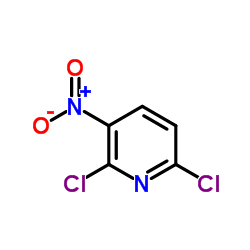
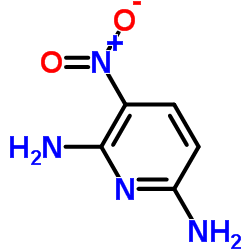
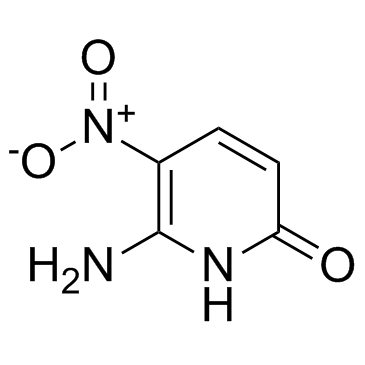
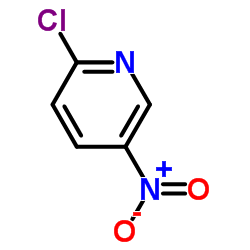
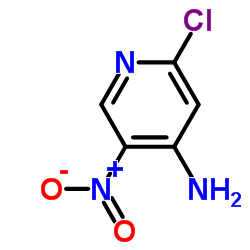

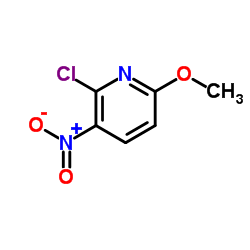

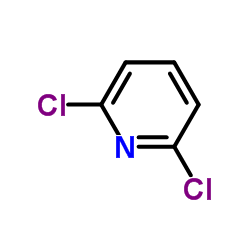
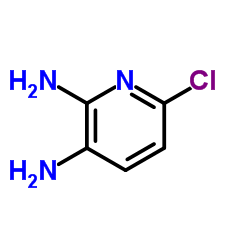 CAS#:40851-95-4
CAS#:40851-95-4 CAS#:1426845-56-8
CAS#:1426845-56-8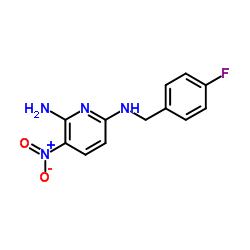 CAS#:33400-49-6
CAS#:33400-49-6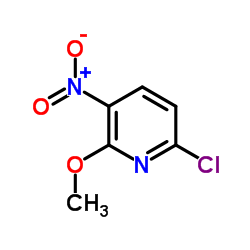 CAS#:40851-91-0
CAS#:40851-91-0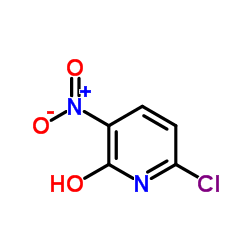 CAS#:92138-35-7
CAS#:92138-35-7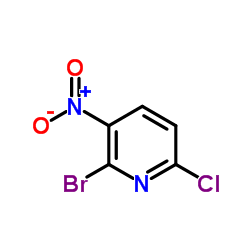 CAS#:91678-23-8
CAS#:91678-23-8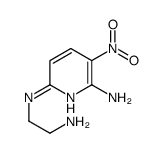 CAS#:252944-01-7
CAS#:252944-01-7 CAS#:84487-04-7
CAS#:84487-04-7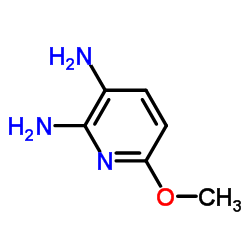 CAS#:28020-38-4
CAS#:28020-38-4
